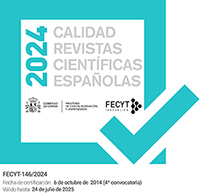La historia como vehículo político : la figura real en la "Crónica de Alfonso XI"
DOI:
https://doi.org/10.5944/etfiii.13.2000.5657Abstract
Empleando las características señaladas por Bernard Guenée en «States and Rulers in Later Medieval Europe», se analiza en este artículo la composición de la «Crónica de Alfonso Xl>> como un intento de presentar a Alfonso XI como típico rey administrador, producto del derecho justinianeo y bien diferente del rey caballero de la Alta Edad Media. Frente a éste, cuyo objetivo vital era la consecución de la felicidad, Alfonso, fiel representante de un nueva interpretación de los deberes y obligaciones del monarca, debe: preocuparse por establecer su legitimidad para que nadie cuestione su papel de «dominus naturalis»; rodearse de consejeros capaces y competentes (es decir, de profesionales del derecho); preocuparse no sólo por la paz, sino también por la prosperidad del reino; legislar, eliminando malas leyes y creando buenas leyes nuevas; ejercer el gobierno, primero, con sabiduría práctica, parte acumen político, parte prudencia y, después, con justicia; y, por último, asegurarse de tener éxito en el mundo, ya que deber ser éste su objetivo vital.This paper analyzes the composition of the «Crónica de Alfonso XI» by making use of the characteristics proposed by Bernard Guenée in his «States and Rulers in Later Medieval Europe». It is asserted that this chronicle constitutes an attempt to present Alfonso XI as a typlcal administrator-king, product of Justinian law and quite distinct from the knight-king of the Later Middie Ages. As opposed to the latter's Ufe objective of achieving happiness, Alfonso, faithful representative of a new interpretation of the duties and obligations of the monarch, should strive to: establish his legitimacy as king so that no one would question his role of «dominus naturalis»; surround himself with wise and capable counselors (i.e., legal professionals); concern himself not only with the peace of the realm but also witli its prosperíty; legislate, eliminating bad laws and creating better, new ones; govern first with practical wisdom, part political acumen, part prudence and last of all part sense ofjustice; and finally, to ensure his own wordly success, his ultímate objective in life.
Downloads
Download data is not yet available.
Downloads
How to Cite
Martínez, P. (2000). La historia como vehículo político : la figura real en la "Crónica de Alfonso XI". Espacio Tiempo y Forma. Serie III, Historia Medieval, (13), 215–231. https://doi.org/10.5944/etfiii.13.2000.5657
Issue
Section
Artículos
License
Los autores que publican en esta revista están de acuerdo con los siguientes términos:
- Los autores conservan los derechos de autor (copyright) de las obras publicadas y garantizan a la revista el derecho de ser la primera publicación del trabajo al igual que permiten la reutilización del mismo bajo la licencia de uso indicada en el punto 2.
- Las obras se publican en la edición electrónica de la revista bajo una licencia Creative Commons Reconocimiento-NoComercial 4.0 Internacional, que permite a otros compartir el trabajo con un reconocimiento de la autoría del trabajo y de la publicación inicial en esta revista. Se pueden copiar, usar, difundir, transmitir y exponer públicamente, siempre que: i) se cite la autoría y la fuente original de su publicación (revista, editorial y URL de la obra); ii) no se usen para fines comerciales.
- Se permite y se anima a los autores a difundir electrónicamente las versiones pre-print (versión antes de ser evaluada) y/o post-print (versión evaluada y aceptada para su publicación) de sus obras antes de su publicación, ya que favorece su circulación y difusión más temprana y con ello un posible aumento en su citación y alcance entre la comunidad académica (por ejemplo, en repositorios institucionales o en su propio sitio web). Color RoMEO: verde. (Véase The Effect of Open Access) (en inglés).
Authors who publish in this journal agree to the following terms:
- Authors retain copyright and grant the journal right of the first publication with the work simultaneously licensed under a Attribution-NonCommercial-NoDerivatives 4.0 International, that allows others to share the work with an acknowledgement of the work's authorship and initial publication in this journal.
- Authors are able to enter into separate, additional contractual arrangements for the non-exclusive distribution of the journal's published version of the work (e.g., post it to an institutional repository or publish it in a book), with an acknowledgement of its initial publication in this journal.
- Authors are permitted and encouraged to post their work online (e.g., in institutional repositories or on their website) prior to and during the submission process, as it can lead to productive exchanges, as well as to earlier and greater citation of the published work (See The Effect of Open Access).








